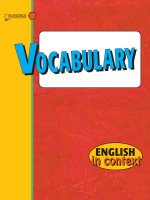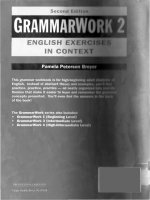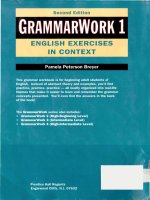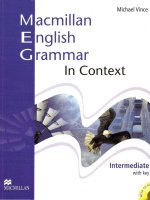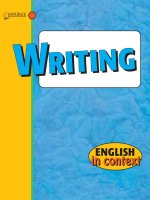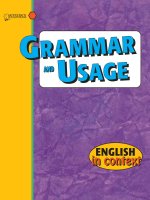Vocabulary english in context
Bạn đang xem bản rút gọn của tài liệu. Xem và tải ngay bản đầy đủ của tài liệu tại đây (817.57 KB, 114 trang )
ENGLISH
in context
in context
CAPITALIZATION AND PUNCTUATION
GRAMMAR AND USAGE
READING COMPREHENSION
SPELLING
VOCABULARY
WRITING
ENGLISH
in context
in context
V
OCABULARY
V
OCABULARY
SADDLEB
A
CK E-BOOK
1
in context
ENGLISH
in context
V
OCABULARY
V
O
C
A
B
U
L
A
R
Y
2
Development and Production: Laurel Associates, Inc.
Cover Art: Elisa Ligon
SADDLEBACK
EDUCATIONAL PUBLISHING
Three Watson
Irvine, CA 92618-2767
Website: www.sdlback.com
Copyright © 2000 by Saddleback Educational Publishing. All rights reserved. No
part of this book may be reproduced in any form or by any means, electronic or
mechanical, including photocopying, recording, or by any information storage
and retrieval system, without the written permission of the publisher.
ISBN 1-56254-356-3
Printed in the United States of America
05 04 03 02 01 00 9 8 7 6 5 4 3 2 1
CAPITALIZATION AND PUNCTUATION
GRAMMAR AND USAGE
READING COMPREHENSION
SPELLING
VOCABULARY
WRITING
ENGLISH
in context
iinn ccoonntteexxtt
3
Introduction 5
UNIT 1
Overview of Language
6
LESSON
1 Varieties of English 6
2 Matching Words to the Occasion 8
3 Parts of Speech 9
4 Using Parts of Speech 10
Unit 1 Review 12
UNIT 2
Analyzing Word Parts
13
5 Word Roots 13
6 Prefixes and Suffixes 14
7 More Prefixes and Suffixes 16
8 Medical Prefixes and Suffixes 17
9 More Prefixes and Suffixes 18
Unit 2 Review 20
UNIT 3
Commonly Confused
Words
21
10 Multiple Meaning Words 21
11 Homophones 23
12 Near Misses 24
Unit 3 Review 25
UNIT 4
Shades of Meaning
26
13 Denotation and Connotation 26
14 Connotations 28
15 Euphemisms 29
16 Trite Language 30
17 Idioms 32
18 Idioms:
Make
and
Take
34
19 Idioms:
Go
and
Get
36
20 Jargon 38
21 Slang 39
Unit 4 Review 40
UNIT 5
Word Origins
41
22 Borrowed Words 41
23 Word Histories 43
24 Compound Words 44
25 Blended, Clipped, and
Coined Words
46
26 Foreign Words and Phrases 48
Unit 5 Review 49
UNIT 6
Reference Books
50
27 The Dictionary 50
28 Dictionary Pronunciation Key 52
29 The Thesaurus 53
Unit 6 Review 55
UNIT 7
Topical Vocabulary
56
30 Art and Music 56
31 Employment 58
32 Advertising 60
33 Science 62
CONTENTS
4
34 Science Careers 63
35 Figurative Language 64
36 Weather 65
37 Driving 66
38 American History
and Geography
68
39 Government 70
40 Forms and Applications 71
41 Computers 72
42 Media 74
43 Media Careers 75
44 Sports 76
45 Plants and Animals 77
Unit 7 Review 78
UNIT 8
Synonyms and
Antonyms A–Z
80
Pretest 80
46 Words Beginning with
A
81
47 Words Beginning with
B
82
48 Words Beginning with
C
83
49 Words Beginning with
D
84
50 Words Beginning with
E
85
51 Words Beginning with
F
86
52 Words Beginning with
G
87
53 Words Beginning with
H
88
54 Words Beginning with
I
89
55 Words Beginning with
J
90
56 Words Beginning with
K
91
57 Words Beginning with
L
92
58 Words Beginning with
M
93
59 Words Beginning with
N
94
60 Words Beginning with
O
95
61 Words Beginning with
P
96
62 Words Beginning with
Q
97
63 Words Beginning with
R
98
64 Words Beginning with
S
99
65 Words Beginning with
T
100
66 Words Beginning with
U
101
67 Words Beginning with
V
102
68 Words Beginning with
W
103
69 Words Beginning with
X, Y, Z
104
Unit 8 Review 105
Reference Guide 107
5
Building a good vocabulary doesn’t mean memorizing long
lists of difficult words. It doesn’t mean spending long hours
reading a dictionary, either. Your everyday activities present
plenty of opportunities to increase your word power.
The benefits of having the “right” words at your command
are obvious. People who can express themselves with precision
and grace have a clear advantage over those who can’t. They
can count on themselves to speak confidently and write with
self-assurance. In competitive situations at school or on the
job, language skills are an enormous asset. In personal and
social situations, the ability to communicate your needs,
thoughts, and feelings can make your relationships stronger
and your life less stressful.
The instruction in this book will give you access to hundreds
of new and interesting words. As you complete each lesson,
try to integrate as many words as you can into your speech
and writing. While no amount of practice can promise
perfection
, practice does guarantee improvement! And
remember that the best word to use is not necessarily long or
fancy; it’s the one that conveys the exact meaning you intend.
Careful attention as you work your way through this book is a
wise investment in your future as a “great communicator”!
INTRODUCTION
6
Vocabulary skill is based on a clear understanding of language itself. The
language you use must be appropriate to the situation. Think about it. Would
you dress for a job interview in the clothes you wore to clean the garage?
Would you polish your shoes before going to the beach, or wear your favorite
torn sweatshirt to a formal reception? Appropriate language is like appropriate
clothing. It shows that you understand the requirements of different occasions
and circumstances.
Two major categories of English are called
standard
and
substandard
.
Standard
English
is the language of educated people—those who know and follow the
conventional rules of grammar and usage.
Substandard English
, which usually breaks accepted rules in the use of pronouns
and certain verb forms, is associated with the uneducated.
EXAMPLES: STANDARD:I
saw
that movie.
He
and
I
are friends.
SUBSTANDARD:I
seen
that movie.
Him
and
me
are friends.
Write
S
or
SS
to show whether each sentence below is written in
standard English
or
substandard English
.
1. _____ Dizzy Dean, once a great pitcher for the St. Louis
Cardinals, was famous for using substandard speech.
2. _____ Dizzy’s brother Paul was also a pitcher for the Cards.
3. _____ “A teacher wrote to say that she don’t like the way
I talk,” said Dizzy.
4. _____ “She don’t want me to say that a runner slud into
second base.”
5. _____ “What does she want me to say—slided?”
6. _____ “Me and Paul don’t like to worry about that sort
of stuff,” said Dizzy.
OVERVIEW OF LANGUAGE
FOR HELP WITH THE LESSONS IN THIS BOOK, SEE THE REFERENCE GUIDE, PAGES 107–112.
UNIT
1
1
VARIETIES OF ENGLISH
A
7
Rewrite the sentences in standard English.
1. I noticed you was late getting home last night.
____________________________________________________________________
2. Haven’t you got no respect for the house rules?
____________________________________________________________________
3. Dad don’t like you staying out after midnight.
____________________________________________________________________
4. If Dad catches you hisself, you’ll be grounded!
____________________________________________________________________
There are different forms of standard English. The two most important varieties
are
formal
and
informal.
Formal English is used for serious purposes: research
papers, literary essays, important speeches, and essay questions on exams.
Characteristics of formal English include the following:
1
B
•
Sentences are very carefully
constructed.
•
rarely contains slang
•
uses words not common in
everyday speech and writing
•
avoids the use of contractions
Most of the time, educated people use informal language. Whether written or
spoken, their sentences sound more like conversation than like lines from a
formal speech. Newspapers, magazines, novels, and business letters are written
in informal English. Characteristics of informal English include the following:
•
includes both long and short
sentences
•
uses contractions
•
uses vocabulary that is clear
and simple rather than elegant
•
uses limited slang
Read each pair of words. Circle the
formal
word and underline
the
informal
word.
1. kids children 5. rich prosperous
2. colleagues coworkers 6. aspirations goals
3. started originated 7. balance moderation
4. propose suggest 8. assert say
C
8
Long, difficult words are not necessarily the
best
words for all occasions. Effective
communicators understand the difference between simple, everyday speech
and what is called the “King’s English.”
Which kind of English is appropriate in each situation below?
Write
formal
or
informal
on the lines.
1. a thank you note for a gift: 4. a classroom discussion:
______________________________ ______________________________
2. a letter to the PTA: 5. an academic journal article:
______________________________ ______________________________
3. a legal document: 6. a newspaper article:
______________________________ ______________________________
Practice writing sentences in both formal and informal English. If the
sentence is written in formal English, rewrite it in informal English. If
the language is informal, rewrite it in formal language. As an
example, the first sentence has been done for you.
1. Van’s lame suggestion was probably a put-on.
____________________________________________________________________
2. An overly intensive study schedule may adversely affect your
social aspirations.
____________________________________________________________________
____________________________________________________________________
3. Great Britain’s royals packed the room at the uppercrust charity bash.
____________________________________________________________________
____________________________________________________________________
4. Persistent procrastination before studying is a self-indulgence
students can ill afford.
____________________________________________________________________
____________________________________________________________________
2
MATCHING WORDS TO THE OCCASION
A
B
Van’s unworkable suggestion was likely meant as a joke.
9
All words are classified as one of eight
parts of speech:
adjective, adverb,
conjunction, interjection, noun, preposition, pronoun, or verb.
Nouns, pronouns, and verbs are the most important parts of speech. Why?
Because you need a noun or a pronoun, along with a verb, to make a sentence.
Nouns
are words that name people, places, and things.
EXAMPLES:
Vanessa street government engine honesty
Pronouns
are words used in place of nouns.
EXAMPLES:
she I you its them their our mine
Verbs
are words that express action or being in the past, present, or future.
EXAMPLES:
walk, walked, will walk am, was, have been
Circle the word that is the part of speech listed in
boldface
.
1. noun why often boulder us
2. verb shook rotten quickly therefore
3. pronoun cape believed me wished
Adjectives
add to the meaning of nouns or pronouns by telling
which one, what
kind,
or
how many.
EXAMPLES:
that
pencil
red
car
three
boys
Adverbs
add to the meaning of verbs, adjectives, or other adverbs by telling
how, when, where, why,
or
to what degree.
EXAMPLES: cried
loudly almost
dark
very
happy
arrived
early
come
here still waiting
In each sentence, underline the
adjective
and circle the
adverb
.
1. Six hens clucked softly. 4. Never tease wild animals.
2. The hog is very fat. 5. Tiny mice scurry quickly.
3. That cow eats lazily. 6. Those birds fly high.
PARTS OF
SPEECH 3
A
B
10
(ADJECTIVE)
(ADJECTIVE)
(ADJECTIVE)
(VERB)
(VERB)
(ADVERB)
(ADVERB)
(PRONOUN)(PRONOUN)
(PRONOUN)
(NOUN)
Use words from the box to complete the sentences.
proverbs never clever some saves strange you
stitches always dense nine wastes old them
remember kindly their me we explain it
1. An __________________ proverb advises that “a stitch in time
__________________ nine.”
2. I may be __________________, but I’ve __________________ been sure
about what that saying means.
3. Do __________________ understand __________________?
4. Does the “stitch in time” save __________________ minutes or nine more
__________________?
5. Will you _________________ _________________ it to __________________ ?
Give your own examples of each part of speech.
1. nouns __________________ __________________ __________________
2.
verbs __________________ __________________ __________________
3.
pronouns __________________ __________________ __________________
4.
adjectives __________________ __________________ __________________
5.
adverbs __________________ __________________ __________________
A
B
4
USING PARTS OF SPEECH
11
Read what four famous writers had to say about the importance of
words. Then identify the called-for parts of speech in each quotation.
Write the words on the lines.
1. Words form the thread upon which we hang our experiences.
—Aldous Huxley
two verbs _________________________ _________________________
two pronouns _________________________ _________________________
2. One’s vocabulary needs constant fertilization or it will die.
—Evelyn Waugh
two nouns _________________________ _________________________
two verbs _________________________ _________________________
one adjective _________________________
3. The difference between the almost right word and the right
word is really a large matter—’tis the difference between the
lightning bug and the lightning.
—Mark Twain
three adjectives
_________________________ _________________________
_________________________
five nouns _________________________ _________________________
_________________________ _________________________
_________________________
one adverb _________________________
4. Words are the hummingbirds of the imagination.
—Elbert Hubbard
three nouns _________________________
_________________________
_________________________
one verb _________________________
4
C
12
Rewrite only the sentences that are written in substandard English.
If the sentence is written in standard English, write correct.
1. Ms. Haworth never makes no mistakes in grammar.
____________________________________________________________________
2. Leticia and Esther are our two best debaters.
____________________________________________________________________
3. I and Collette was chosen to be co-captains.
____________________________________________________________________
4. Marty run into Kevin at the dance last night.
____________________________________________________________________
5. Andrew’s scholarship was the result of hard work.
____________________________________________________________________
Write I or F next to each phrase to show whether it is an example
of formal or informal English.
A
B
1. _____ fortuitous circumstances
2. _____ a lucky break
3. _____ inevitable consequences
4. _____ a crying shame
5. _____ a favorable omen
6. _____ couldn’t care less
Write noun, pronoun, verb, adjective, or adverb to identify the words
in each group. Hint: You will write one part of speech twice.
1. slowly, well, somewhat: 4. exploded, does, thinks:
______________________________ ______________________________
2. wheat, Idaho, community: 5. eleven, bald, dangerous:
______________________________ ______________________________
3. us, you, themselves: 6. loyalty, conscience, vapor:
______________________________ ______________________________
C
UNIT REVIEW
1
13
Many words in the English language are based on
word roots.
New
words are formed when other word parts are added to a root. Some
of our word roots come from Old English—the form of English
that was spoken and written from the 500s to about 1150
A.D. Most
of our roots come from Latin, however, and many come from Greek.
LATIN ROOTS GREEK ROOTS
cred—belief bio—life
dic, dict—say, speak chron, chrono—time
fac, fact—do, make geo—earth
man—hand hydr—water
ped—foot log, logy—speech, study, word
vert, vers—turn psych—mind
vid, vis—see therm—heat
Understanding Latin and Greek roots will help you determine the
meaning of many unfamiliar words.
Circle the
root
in each word below. Then use the word in a sentence of
your own. Check a dictionary if you’re not sure of the word’s meaning.
1. convert ____________________________________________________________
____________________________________________________________________
2. dehydration ________________________________________________________
____________________________________________________________________
3. biography __________________________________________________________
____________________________________________________________________
4. contradict __________________________________________________________
____________________________________________________________________
Write a word based on each root listed below.
1. ped __________________________ 3. man _________________________
2. geo __________________________ 4. vis __________________________
ANALYZING WORD PARTS
FOR HELP WITH THE LESSONS IN THIS BOOK, SEE THE REFERENCE GUIDE, PAGES 107–112.
UNIT
2
WORD ROOTS 5
A
B
14
Word parts called
prefixes
and
suffixes
are added to roots to build words.
A
prefix
is added to the beginning of a word or root to change its meaning.
EXAMPLES:
pre
(before) + historic =
prehistoric
(before recorded history)
co
(with, together) + exist =
coexist
(exist together)
A
suffix
is added to the end of a word or root to change its meaning.
EXAMPLES:
en
(made of, like) + oak =
oaken
(made of oak)
less
(without) + penny =
penniless
(without a penny)
Define each
boldfaced
word in your own words. Then define the prefix
that appears in both words. The first item has been done for you.
1. impatient _____________________________________________
impossible ____________________________________________
The prefix im must mean ________________________________
2. submarine ____________________________________________
substandard __________________________________________
The prefix sub must mean _______________________________
3. interview _____________________________________________
intercom ______________________________________________
The prefix inter must mean ______________________________
4. mistake _______________________________________________
misunderstand ________________________________________
The prefix mis must mean _______________________________
5. recycle ________________________________________________
review ________________________________________________
The prefix re must mean ________________________________
6
PREFIXES AND SUFFIXES
A
not patient
not possible
not
15
Write a sentence using one of the
boldfaced
words. Then define the
suffix
in all three word choices.
1. counselor, actor, sailor ____________________________________________
____________________________________________________________________
The suffix or must mean ____________________________________________
2. thoughtful, grateful, suspenseful _________________________________
____________________________________________________________________
The suffix ful must mean ____________________________________________
3. creative, elusive, positive _________________________________________
____________________________________________________________________
The suffix ive must mean ____________________________________________
4. robbery, bakery, surgery __________________________________________
____________________________________________________________________
The suffix ery must mean ___________________________________________
Write a letter to match each suffix on the right with its definition
on the left.
1. _____ small a. the suffix ship as in showmanship
2. _____
art or skill of b. the suffix ite as in meteorite
3. _____
state or quality of c. the suffix cule as in molecule
4. _____
inclined to d. the suffix cy as in accuracy
5. _____
mineral or rock e. the suffix ative as in talkative
6
B
C
16
Combine a
prefix
from the box with the
boldfaced
word in
parentheses to complete the sentence.
ir in re pre semi non
1. On her first day at the new school, Rosie felt (secure)
____________________.
2. The teacher thought that Christopher’s excuse was utter
(sense) ____________________.
3. If you (pay) ____________________ for something, you send
the money ahead of time.
4. Tricking someone else into doing your work is lazy and
(responsible) ____________________.
5. James will have to (place) ____________________ the
basketball he lost.
6. Gloria’s cookie recipe calls for (sweet) ____________________
chocolate chips.
Circle the suffix that correctly completes each sentence.
1. To change the verb tour to a noun meaning “one who
tours,” add the suffix ( or / ist / er ).
2. To change the noun speed to an adjective meaning
“very fast,” add the suffix ( ly / er / y ).
3. To change the verb break to an adjective meaning
“capable of being broken,” add the suffix ( ible / able / ery ).
4. To change the noun envy to an adjective meaning
“jealous,” add the suffix ( bus / ous / ish ).
5. To change the noun taste to an adjective meaning
“in good taste,” add the suffix ( y / ier / ful ).
7
MORE PREFIXES AND SUFFIXES
A
B
17
Study the word parts in the chart. Many English words describing medical
conditions are made from these word parts from Latin and Greek.
PREFIXES MEANING SUFFIXES MEANING
a, an
without, lacking
algia
pain
arthro
joint
ectomy
surgical removal of
gastr(o)
stomach
emia
blood
hem(o, a)
blood
itis
inflammation
hyper
over, excessive
plegia
paralysis
hypo
under, deficient
oma
tumor, growth
myo
muscle
neur(o)
nerve
Use information from the chart to help you choose the word that
correctly completes each sentence.
1. ( Arthritis / Arthremia ) is a painful inflammation of body joints.
2. ( Hyperglycemia / Hypoglycemia ) is an abnormally low concentration
of sugar in the blood.
3. Patients who have had a tonsillectomy have had their tonsils
( paralyzed / removed ).
4. One who suffers from gastritis has ( heart / stomach ) problems.
5. Anemia is diagnosed by analyzing a person’s ( nerves / blood ).
6. A woman who has neuralgia has ( pain / blood ) in her ( joints / nerves ).
7. A paraplegic suffers ( pain / paralysis ) in the lower body.
8. A myoma is a ( tumor / inflammation ) consisting of muscular tissue.
Use information from the chart and a dictionary to help you complete
the sentences.
Hint:
The first letter of each missing word is provided.
1. ______________________ is a chronic lack of appetite for food.
2. Abnormally high blood pressure is called ___________________________.
3. A tumor or swelling filled with blood is called a _______________________.
MEDICAL PREFIXES AND SUFFIXES
8
A
A
h
h
B
18
First read each paragraph of
The Crow and the Pitcher
. Then fill in
the blanks according to the instructions. Follow the same steps for
The Sun and the Wind
on the next page.
The Crow and the Pitcher
A crow who was very thirsty found a tall, narrow pitcher.
It was partly filled with water. But the crow was unable to
enjoy a drink. His beak reached only halfway down the
pitcher, and the water was below that level. The unhappy
crow regretfully prepared to go on being thirsty.
Write words from the paragraph that have these
prefixes:
1. en ______________________ un ________________________
be ______________________ pre ________________________
Write words from the paragraph that have these
suffixes:
2. y _______________________ way _______________________
ly ______________________ fully _______________________
But the crow was clever. An idea occurred to him.
He picked up a nearby pebble in his beak. Skillfully, he
dropped the pebble into the pitcher. Then he dropped more
and more pebbles. Slowly, the pebbles displaced the water
in the bottom of the pitcher. As the water rose higher, the
crow was enabled to drink it. What a relief for the crow!
Write word from the paragraph that have these
prefixes
:
3. dis _____________________ en _________________________
in ______________________ re _________________________
Write words from the paragraph that have these
suffixes
:
4. by ______________________ fully ______________________
ly ______________________ er ________________________
9
MORE PREFIXES AND SUFFIXES
19
The Sun and the Wind
The sun and the wind had an argument. “I am
more powerful than you,” howled the wind.
The sun disagreed. “Let us have a test to decide
which of us is more powerful,” he cried hotly. “Do
you see the man walking on the street down there?
Are you strong enough to make him take off his coat?”
Write words from the paragraph that have these
prefixes
:
5. de ____________________ dis _____________________
Write words from the paragraph that have these
suffixes
:
6. ful ___________________ ment ___________________
ly ____________________ ing _____________________
“That’s easy,” moaned the wind. He blew harder
and harder. The man became cold. To protect himself,
he pulled his coat tightly around him. Finally, the
wind admitted that he could do nothing more to
remove the coat. Now it was the sun’s turn to show
his mighty power.
Write words from the paragraph that have these
prefixes
:
7. ad ___________________ re ______________________
pro ___________________ be ______________________
The sun began to shine brightly. Soon the man grew
warmer. He removed his coat to enjoy the warmth of the sun.
Laughing loudly, the sun told the wind, “Do you see why I
was successful? You met with failure because you used force.
Sometimes kindness is more powerful than force.”
Write words from the paragraph that have these
suffixes
:
8. ly ____________________ er ______________________
ful ___________________ ness ____________________
9
20
Write T or F to tell whether each statement below is true or false.
1. _____ Many modern English words are based on roots from
ancient Latin and Greek.
2. _____ A prefix may be added either to the beginning or the
end of a root.
3. _____ A group of letters added to the end of a word is called
a suffix.
4. _____ The word unmentionable has both a prefix and a suffix.
5. _____ The word unknowingly has one prefix and two suffixes.
6. _____ The same root can have an entirely different meaning
in different words.
Read the definitions. Then use prefixes and suffixes to complete
the words.
1. ___ ___ ___ ___ ___
NATIONAL: between or among nations
2. ___ ___
JOIN: to join again
3. ___ ___
PRACTICAL: not useful or efficient
4.
PRE ___ ___ ___ ___: to forecast or guess a future event
5. ___ ___ ___
GRAPHY: the story of someone’s life
6.
MERCI ___ ___ ___: full of pity and forgiveness
7.
WORTH ___ ___ ___ ___: without value
8.
CONSTANT ___ ___: on and on without stopping
9.
NEUR ___ ___ ___ ___: inflammation of the nerves
A
B
UNIT REVIEW
2
21
People with word power are careful about mixing up words. Confusion usually
occurs between words that are very similar.
Many English words have more than one meaning and can be used as different
parts of speech. To add to the confusion, these words are often pronounced
differently, as well.
EXAMPLES: a
bow
and arrow (noun that rhymes with
go
)
the
bow
of a ship (noun that rhymes with
cow
)
to
bow
before the king (verb that rhymes with
now
)
Study each
boldfaced
word. Then identify its part of speech.
On the line, write
noun, verb, adjective,
or
adverb.
1. Invite the duke and the count. 5. It might rain today.
______________________________ ______________________________
2. Count the remaining tokens. 6. We have power and might.
______________________________ ______________________________
3. Go down to the basement. 7. Are all students present?
______________________________ ______________________________
4. Goose down is very soft. 8. I gave Taylor a present.
______________________________ ______________________________
Write a word that
rhymes
with each boldfaced word.
1. to shed a tear _________________ 5. dove in the pool ______________
2. to tear up paper _______________ 6. cooing of a dove _______________
3. to sow seeds __________________ 7. does and fawns _______________
4. a sow in a sty _________________ 8. does good work _______________
COMMONLY CONFUSED WORDS
FOR HELP WITH THE LESSONS IN THIS BOOK, SEE THE REFERENCE GUIDE, PAGES 107–112.
UNIT
3
MULTIPLE MEANING WORDS 10
A
B
22
Add
vowels
(a, e, i, o, u) to complete the multiple meaning words.
Hint:
Use the word’s part of speech as a clue to meaning.
1. BR ___ DG ___ is a popular card game.
2. Her
P ___ T ___ NT leather shoes are shiny.
3. Light the fire with a
M ___ TCH.
4. A
R ___ R ___ bird is hard to find.
5. Please fry me a pork
CH ___ P for dinner.
6. An out-of-date license is ___
NV ___ L ___ D.
7. A
P ___ LM is a common tropical tree.
8. A
CR ___ T ___ is a slatted wooden container.
Use the clues to complete the crossword puzzle.
Hint:
Answers are the words you completed in Part C.
ACROSS
1. the inside of your hand
3. a rickety old vehicle (slang)
4. not cooked much
6. disabled person
7. to cut with a sharp blade
DOWN
1. official right to make or sell your invention
2. road that arches over an obstacle
5. to pair up things that are alike or equal
MULTIPLE MEANING WORDS
10
C
D
(NOUN)
(ADJECTIVE)
(ADJECTIVE)
(NOUN)
(NOUN)
(NOUN)
(ADJECTIVE)
(NOUN)
1
6
5
4
3
2
7
23
Homophones
are words that sound the same but have different meanings and
usually different spellings.
EXAMPLES:
pail
(a bucket)
/
pale
(white)
ant
(insect)
/
aunt
(female relative)
Read the sentences. Write a
homophone
for each
boldfaced
word on
the line. The first one has been done for you.
1. How hi _____________ can ewe ______________ jump?
2. The boss overseas ____________________ for _______________ workers.
3. Pleas __________________ stand over their _______________.
4. Does that hoarse ________________ need a bridal ________________?
5. Wheel ____________________ bee ____________ home soon.
Circle the correct words. Then rewrite the sentences on the lines.
1. Rupert ( maid / made ) a ( very / vary ) big mistake.
____________________________________________________________________
2. I ( heard / herd ) he didn’t pay the ( tax / tacks ) on his house.
____________________________________________________________________
3. Now the government has put a ( lean / lien ) on his property.
____________________________________________________________________
4. Rupert doesn’t ( no / know ) what to ( dew / do ) about it.
____________________________________________________________________
5. ( We’ve / weave ) ( tolled / told ) ( hymn / him ) to ( meat / meet )
with a lawyer.
____________________________________________________________________
6. Maybe it ( wood / would ) be wiser for Rupert to take out a
( lone / loan ) and pay up.
____________________________________________________________________
HOMOPHONES 11
A
B
high
you
24
Near misses
are words that are similar in one way or another. These words
have different meanings, however. Be careful! Misusing look-alike or sound-
alike words can cause embarrassing errors.
Circle the word that makes sense in each sentence.
Use a dictionary if you need help.
1. People are said to ( emigrate / immigrate ) when they
leave a country and ( immigrate / emigrate ) when they
enter another country.
2. In anything you write, chances are you will use at
least one ( proposition / preposition ).
3. The arrival of our ( imminent / eminent ) speaker is
( imminent / eminent).
4. I wish I had an autographed ( pitcher / picture ) of that
famous ( pitcher / picture ).
5. You may ( disprove / disapprove ) of my opinion, but
you can’t ( disprove / disapprove ) it.
6. I am ( confident / confidant ) that my friend and
( conf idant / confident ) will keep my secrets.
7. Is it possible for you to ( device / devise ) a
( devise / device ) to solve that problem?
8. The attorney is ( prosecuting / persecuting ) a man
charged with ( prosecuting / persecuting ) his dog.
9. Iran was ( formally / formerly ) called Persia until its
name was ( formally / formerly ) changed.
10. The sick boy should ( lie / lay ) his backpack on the
floor and ( lie / lay ) down in the nurse’s office.
12
NEAR MISSES

